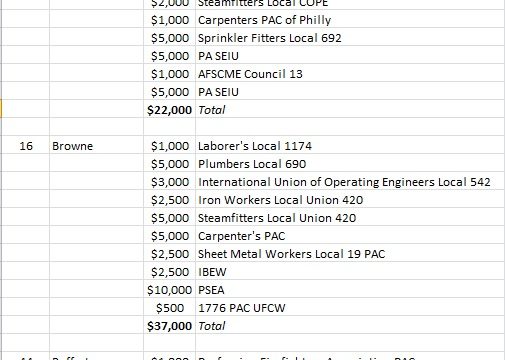In three state Senate races, unions give heavily to GOP incumbents in campaign’s final days

By Eric Boehm | PA Independent
Three incumbent Republican state senators facing re-election battles in the Philadelphia suburbs have received a late infusion of cash from labor unions.
In the two weeks leading up to Tuesday’s election, labor unions directed at least $66,000 to the campaign war chests of state Sen. Pat Browne, R-Lehigh; state Sen. John Rafferty, R-Montgomery; and state Sen. Tommy Tomlinson, R-Bucks.
CROSSING PARTY LINES: Unions generally back Democratic candidates, but three Republican state senators got big bucks from public and private sector unions in the final days of the fall campaign.
During that time, no labor union contributions came to the Democratic candidates in those three races.
PA Independent reviewed campaign finance reports showing contributions during the final 10 days of the campaign cycle — when candidates are required to file daily updates with the Department of State listing all contributions of at least $500 — in the 25 contested state Senate districts. The overwhelming majority of late contributions from labor unions were directed toward Democratic candidates, with most Republican candidates getting little to no money from organized labor.
Rafferty got $7,000 during the past two weeks, with $5,000 of that total coming from the Pennsylvania State Education Association, or PSEA, the state’s largest teachers’ union.
Tomlinson received $22,000 in contributions from seven different unions, representing both public- and private-sector workers. The Service Employees International Union, or SEIU, gave him $10,000 of that total.
Browne led the way in the final days of the campaign, receiving $37,000 from both public- and private-sector unions, according to campaign finance reports. The PSEA again led the way, giving $10,000 to Browne last Friday.
During the past two years, Browne was one of the architects of a proposal to overhaul the state’s public pension system that was opposed by public-sector unions like the PSEA. He would likely play a key role in any effort to address the state’s $50 billion unfunded pension liability in the next session.
The relationship between unions and some Republican lawmakers is one of the more fascinating insider stories in Harrisburg, and plays a part in nearly every hot-button issue in the Capitol.
In 2012, for example, the union that was leading the opposition to liquor privatization gave more than $12,000 to Republican candidates in the state House and state Senate. Unions’ ability to build coalitions across party lines also helped stop a GOP-led effort to reform labor laws that mandate the payment of union dues and helped grease the skids on the major transportation funding bill approved last year.
Even in the Philadelphia suburbs, where moderate Republicans in the General Assembly long have had a close relationship with labor unions, the contributions to Browne, Rafferty and Tomlinson stood out as outliers.
Three other Republican incumbents in the southeastern corner of the state are facing re-election this year: state Sen. Stewart Greenleaf, R-Montgomery; state Sen. Chuck McIlhinney, R-Bucks; and state Sen. Bob Mensch, R-Montgomery.
Since Oct. 24, Mensch received a single $1,500 contribution from the International Brotherhood of Electrical Workers, or IBEW, and Greenleaf got $500 in last-minute cash from the United Mine Workers.
The union money flowing to Browne, Rafferty and Tomlinson could stoke conservatives’ argument that moderate Republicans have stifled pension reform, the privatization of the state liquor stores and other issues that unions in Pennsylvania oppose. But those contributions are only a small part of the overall fundraising reported by those candidates in the campaign’s final days.
Tomlinson has reported more than $90,000 in contributions since Oct. 21. Rafferty reported more than $81,000 during the same period, and Browne reported more than $120,000, according to campaign finance reports.







